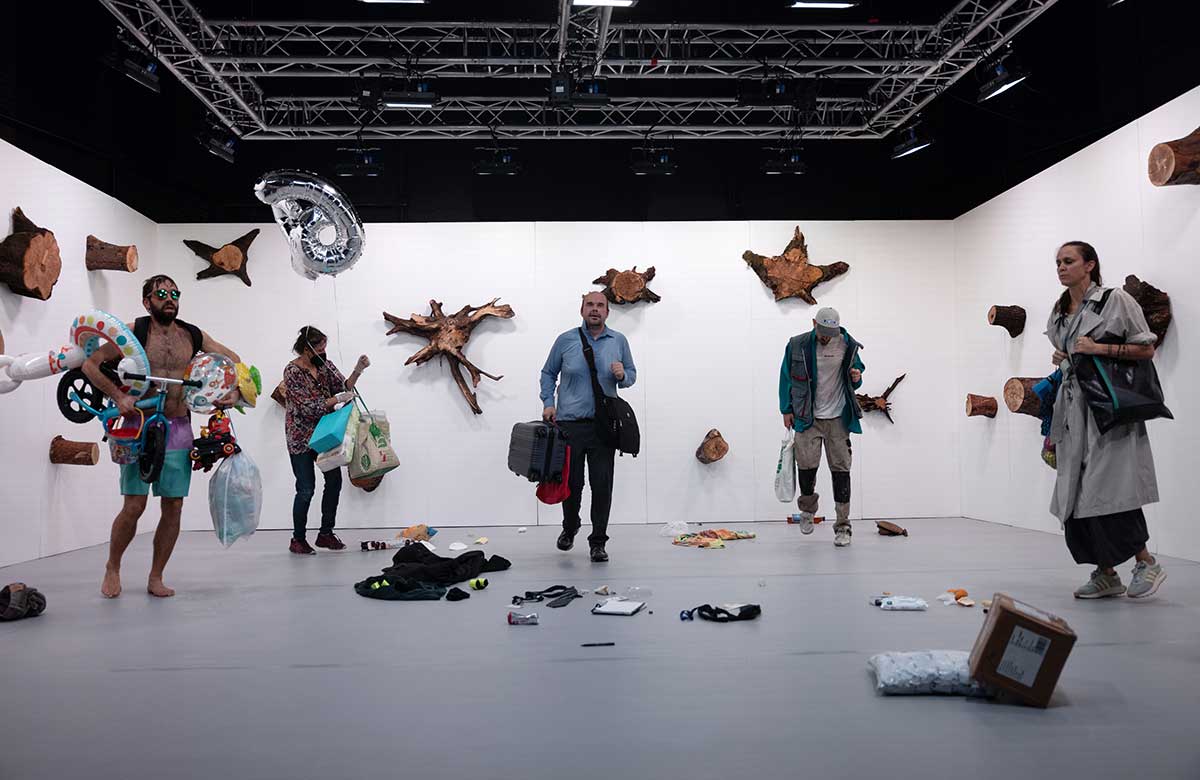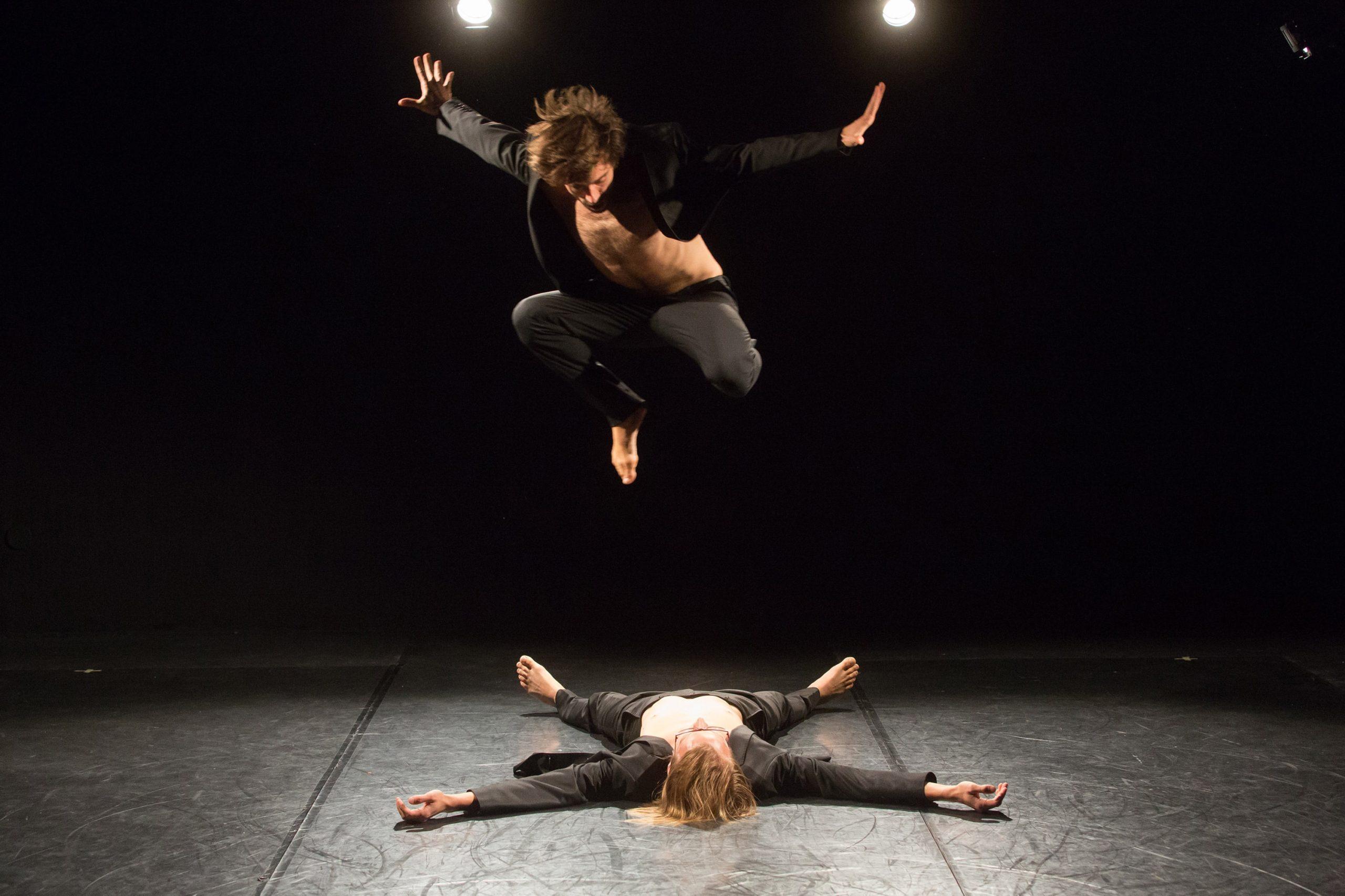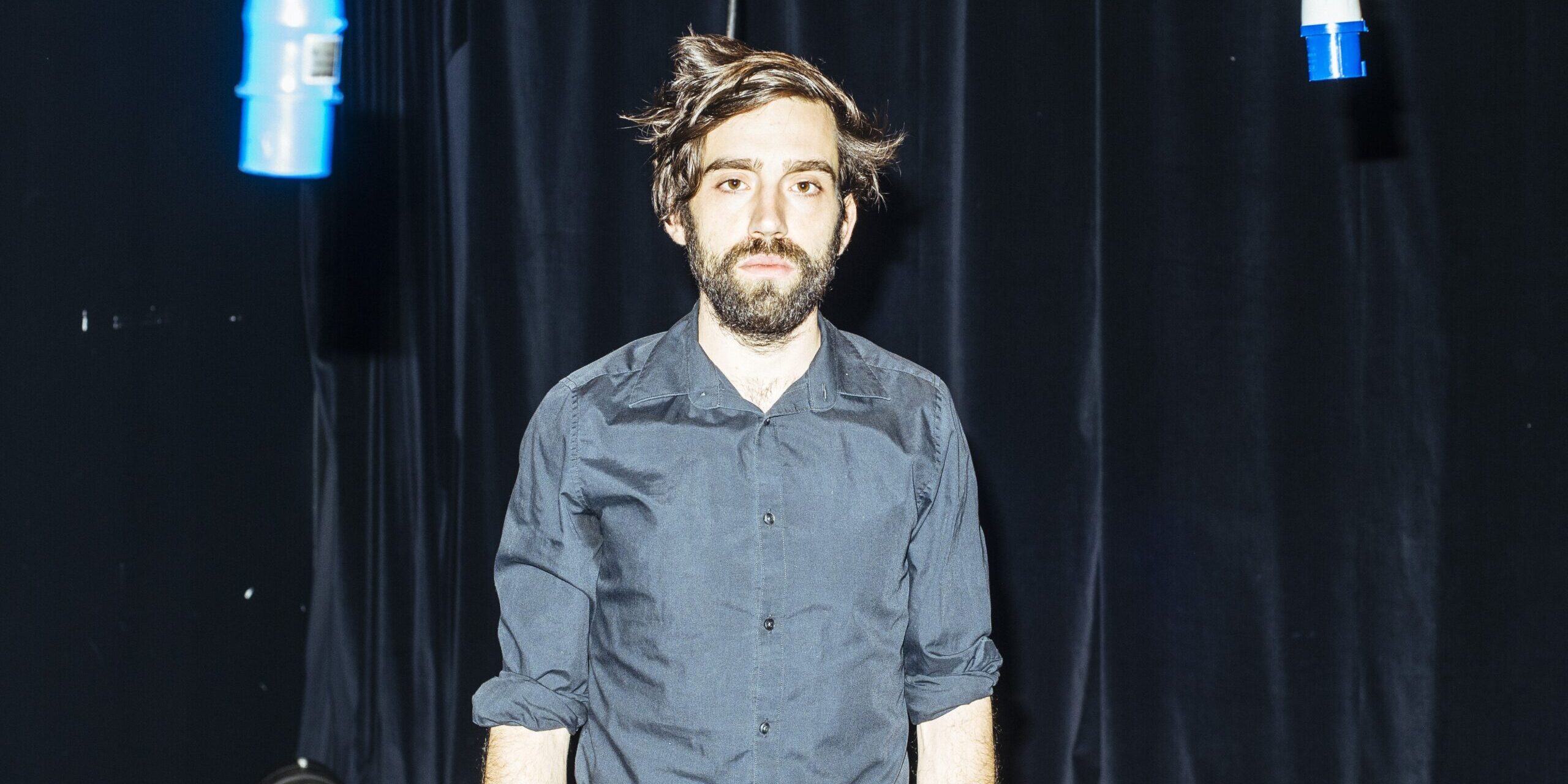Before joining the Mladinsko Theatre ensemble in 2019, Vito Weis spent many years working across drama, dance, and physical theatre. He spoke to Natasha Tripney about performing naked on stage, his collaborations with Žiga Divjak and his role in Duncan Macmillan’s People Places and Things.
Natasha Tripney: One of the performances you’re currently starring in is Žiga Divjak’s Crises in which the ensemble spends two thirds of the show running on the spot while carrying various cumbersome items. Can you tell me a bit about the creative process?
Vito Weis: Crises was inspired by two texts – Less is More by Jason Hickel and The Mushroom at the End of the World by Anna Tsing. This was our thematic base ground. First, we spent a couple of weeks talking about these topics and sharing our opinions. Then we embarked on a process of improvisations. The idea of running on the spot as basic motion, popped out of this process. We knew that the text would be recorded, like a documentary voiceover. Later, in the second phase of the process, over every week we worked on it, we kept adding more running to the show.
Natasha Tripney: Crises is clearly a very physically demanding piece to perform. How do you handle that as an actor?
Vito Wies: It’s so demanding that, from the moment you wake up, it dictates your whole day. You’re thinking when is a good time for me to eat my last meal before the show? What should I eat? Did I get enough sleep? Should I take nap in the afternoon? Should I go to the toilet? It’s a huge struggle to perform, so we have to be prepared. You have to approach it in a similar way to a sporting event.
In a more “typical” show, you would prepare yourself psychologically, here it’s not it’s so much about that, not so much about acting (although we have very simple, but strict acting tasks), rather it becomes this task that we have to fulfil. You know that you have to keep going no matter what. Even if you’re really struggling. Throughout the whole show you find yourself asking: can I manage this or not, but somehow you fight through. At the end it’s a metaphor of the world we are living in, precarity by all means, until your last breath.
Natasha Tripney: You’ve worked with Žiga Divjak several times before. It feels like Crises is in some senses, thematically and dramaturgically, a continuation and evolution of his previous work.
Vito Weis: I’ve starred in five of his shows. This one is the most physically demanding, but for example Divjak’s staging of Duncan Macmillan’s Lungs was also challenging in a different way. Nina Ivanišin and I are sitting om opposite sides of the stage. We’re just watching each other for the whole time. We have microphones, but it’s almost like a radio, play We’re sitting very still, and after one and a half hours of that everything starts to hurt, all of your muscles. It’s maybe not something you would judge as demanding at first sight, but it’s still very hard.
Of all the performances that I did with Žiga, Crises is the most demanding, but that is never his starting point. If you want something that looks real, or that the audience feels is real, you have to be relentless toward yourself and the material with which you’re working. There’s always a point you reach when you say: from now on, there is no going back. We have to stick with it.

Crises. Photo: Jelena Jankovic
Natasha Tripney: Tell me a bit more about your solo show Bad Company. As a member of an ensemble how did you find working without the other company members? Is it right you created during lockdown? And is it a reflection on this time?
Vito Weis: Actually, I had this plan for a couple of years before corona. It had been 10 years since I finished the academy, and I felt this this need to do my own piece, to draw a line through my pat thinking about theatre. It was a very interesting process which lasted for more than a year. I planned to have the premiere in fall of 2020. Initially I had so many ideas – I thought I would sing, I would dance, I would show everything I could do – but then during this period of corona, during the long lockdown, I had the theatre to myself 24/7 and suddenly what I was thinking about felt so empty. I had this feeling that I’d already said and done all these things before or seen things like this in other performances. This sort of black hole opened up, this nothingness. What was happening globally seemed connected to this aspect of the creative process, when you have this blank sheet of paper that you have to fill. I was sitting on the stage, and I started to look around, at the wires, and at the chairs, and I thought maybe I can do something with this, maybe I can build a show from this. To take the theatre as it is and build from it. In a way, something very basic happened.
Natasha Tripney: One of the last images in the show, where you end up heaping all the chairs upon yourself and struggling under their weight, was very striking. Where did this come from?
Vito Weis: I felt there should be some sort of catharsis in there because this is theatre. It has to happen. I was doing of an improvisation with these chairs, and I had this idea. I was thinking about the burden of all these expectations that you put on yourself, and that the audience puts on you, and how they keep piling up, and that’s where the image came from. But of course, without the help and guidance of my co-workers, my outside eyes, Bad company wouldn’t be the same show as you seen it.
Natasha Tripney: Recently in the UK, a well-known actor appeared naked on stage, in Ivo van Hove’s A Little Life and it caused a small media storm. Nudity feels more common on the Slovenian scene. As a performer who is frequently naked on stage, what’s is this experience like as an actor? Does it make you feel vulnerable? Or is there liberation in it?
Vito Weis: You feel vulnerable every time, of course. You are always naked, metaphorically. But when you are naked literally, after, let’s say, five or six performances in which you are nude, it becomes easier. There’s also a responsibility in the decision to be naked at some point in a performance because it’s still not so common here, not in all theatres anyway, and not all actors are comfortable with it, which I totally understand. There needs to be a good reason behind it. What do you want to say by doing this?
Heroes is a series of performances I made with Uroš Kaurin. There are three so far. Heroes 2.0 is the most successful and popular one. The subtitle of the show is “The show of all shows” and it is all and only about theatre. We have the monologue of all monologues, the dialogue of all dialogues – and we are naked for the whole show, from the beginning to the end. People only seem to need around five to 10 minutes to adjust, to see this is our thesis, and then there is no more thinking about it, because it’s so natural, but in Heroes the nudity goes hand-in-hand with the show’s concept. If I see nakedness on stage that is not supported in this way, of course it bothers me.
Natasha Tripney: The use of intimacy direction is on the rise in the UK, both on stage and on screen. Is this something that is becoming more common in Slovenia?
Vito Weis: This was not common here. But now discussions are happening around this. There are changes going on here too. We are moving forwards. And I think this is necessary. Žiga is very good in this sense actually, as a director. It is really nice to work with him. He’s very gentle and cautious about how he addresses these topics. If somebody doesn’t feel comfortable with something, he will always try to find a solution. He will never force people to do something that makes them uncomfortable. In Crises one performer did not feel good about being naked at the start and that was fine. He made it work.

Vito Weis in Heroes 2.0. Photo Nada .Zgank
Natasha Tripney: What is it like being part of a resident ensemble? What are the benefits of working with the same group of people? Does it allow you to build trust, to build understanding of each other’s processes?
Vito Weis: I’m still getting used to it. I was freelancing for 10 years before this. I’d had some job offers from different theatres – some of which were very interesting. For example I was invited to join EN Knap group (the only dance company in Slovenia), Iztok Kovač, the founder and leader, had an idea to reform the company into group of dancers, actors, maybe musicians, sort of like Peeping Tom, but this didn’t happen. So, I had all these possibilities open to me, and I was able to choose with whom to work and when to work and it was very satisfying, but it was also hard, because I have two kids, I have a family, and to keep jumping from one project to another all over Slovenia, was exhausting. At one point I worked on five projects in one year and though I thought maybe I could sustain this for a couple of years, I knew I would have a completely breakdown eventually if I didn’t change something.
I had worked at a project at Mladinsko almost every year. Of all the institutional theatres in Slovenia, what Mladinsko is doing, is the closest to what I’m interested in, so joining the Mladinsko ensemble was something natural. For now I will settle here, at least for some time, but we will see what the future will bring. For me it is very important to stay alert and creative all the time.
Natasha Tripney: So how sustainable is it to have a career as an actor in Slovenia?
Vito Weis: For freelance actors, it’s much harder than was 10 years ago because many theatres are taking on guest actors from outside less and less than they used to do. The number of actors the National theatre institutional theatres has taken on from outside the their companies has dropped over the years. And to constantly applying for grants and working only on NGO projects is unfortunately not sustainable, you can quickly become tired on this non stop struggle. In that sense, is it’s quite hard. But if you’re employed by a theatre, if you have a regular paycheque, then of course there are less existential worries. On the other hand, you can easily fall into a non-creative routine, but this is another topic to talk about.
Natasha Tripney: Last time I was here, it was before the 2022 election. How have things changed since then? Have conditions in the cultural sector improved?
Vito Weis: Under our previous right-wing government, it felt as if the main intention was to destroy the cultural scene, or at least the independent scene. It was really fucked up. Our new Minister of Culture, she’s cool. The government wants to make some changes and to make the situation better for freelancers, to take care of healthcare, for example. In that sense at least, they are pro-cultural. But of course, like all the governments, they’re not perfect. Not even close.
Natasha Tripney: Your next production is another Duncan Macmillan play, People, Places and Things. What role do you play?
Vito Weis: I’m playing the role of Mark, a former addict. The text is very good. I already had experience with Duncan Macmillan’s work before [in Lungs]. This role is a big responsibility. We attended some AA meetings in preparation because you have to be careful in how you represent someone who is an addict or a former addict. You cannot take this stuff lightly. The text is also interesting to me because of its connection with theatre [The main character is an actress], with this lie that we’re all living in the theatre fiction. When we were in this AA meeting, they described how they are were also constantly acting and constantly running away from reality and how, in order to deal with your addiction, the first thing you must do is face the truth and acknowledge your condition as an addict.
For more information on Vito Weis’ work visit Mladinsko.com and HeroProject.si
Further reading: review of Crises
Further reading: interview with Žiga Divjak: “We have to completely change our value system”
Natasha Tripney is a writer, editor and critic based in London and Belgrade. She is the international editor for The Stage, the newspaper of the UK theatre industry. In 2011, she co-founded Exeunt, an online theatre magazine, which she edited until 2016. She is a contributor to the Guardian, Evening Standard, the BBC, Tortoise and Kosovo 2.0








